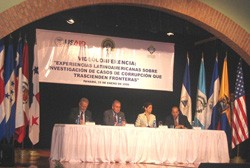
Ana Matilde Gómez was astonished. Having served as Attorney General of Panama for only a few months, she was surprised to meet with a top-level foreign prosecutor, who came to plead for her bureau’s support in investigating more than $50 million transferred, presumably illegally, to Panama by a high profile politician from his country. For Gómez, her bureau’s support was a given, but the visit exposed a larger problem — a lack of regular communications channels at this level between government bodies in Central American countries.
To investigate high-profile corruption cases and recover funds embezzled by government officials, Central American governments — and especially public prosecutors — would need to put in place tools that enabled systematic coordination. Many embezzled funds have allegedly been deposited in Panama, a regional financial center. As Panama’s attorney general, Gómez understood that her leadership could help create an effective response to this situation.
In response, USAID helped her office plan, design, and implement an initiative to address the problem. The first step was to organize a meeting with all six Central American attorneys general. To encourage the greatest possible participation, USAID organized the meeting by video conference. Working with USAID missions in the region, international organizations such as the World Bank, and local organizers in each participating country, the initiative received an overwhelmingly positive response.
Representatives from Nicaragua, Guatemala, El Salvador, Honduras, Costa Rica, and Panama, were joined by officials from Chile, Brazil, Ecuador, and the United States, who attended as observers. More than 400 viewers in 10 countries followed the virtual dialogue. The conference, also available on-line, showcased three successful Latin American experiences in coordinating prosecution and identified past mistakes and future challenges in prosecuting transnational corruption. The event was covered by regional and international media. The first concrete step towards forging cooperative links among public prosecutors in Central America, the conference brought officials and prosecutors closer to creating a regional system to heighten scrutiny of corruption that transcend borders.







Comment
Make a general inquiry or suggest an improvement.